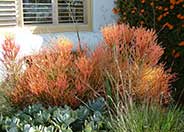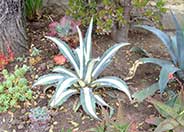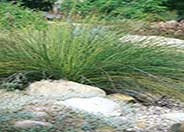
Common name:Olive
Botanical name:Olea europaea
This broad tree will grow to 40' tall and has small, gray green leaves with fleshy black fruit that appears in fall. Purchase fruitless varieties to avoid the mess.

Common name:Sticks on Fire Pencil Tree
Botanical name:Euphorbia tirucalli 'Sticks on Fire'
In frost free areas, Euphorbia can become a 30' tree but in colder areas, it is often knocked back by frost. It can be single or multiple trunked. It has green cylindrical branches that are about the diameter of a pencil. Leaves are not usually present. Some people are allergic to the sap. It is tolerant of salt, full sun, part shade and quite drought resistant. It is a great accent plant for a container. This form has yellow or orange branches if in full sun.

Common name:New Zealand Flax, Purple
Botanical name:Phormium tenax 'Atropurpureum'
Phormium tenax 'Atropurpureum' is an evergreen perennial. Big, dramatic plant composed of many swordlike, stiffly vertical leaves can reach 5' tall. Leaves are purple red. Flowers stems reach high above leaves, bearing clusters of 1"-2" blossoms in dark red.

Common name:Medio Picta Century Plant
Botanical name:Agave americana medio-picta
This form has arching leaves with a creamy white stripe down the center of the blue-green leaf. The leaves are outstanding with their arching form and are well armed with a stout, terminal spine as well as marginal teeth. It is somewhat smaller than the americana variety, growing to around 4.' It prefers full sun, well drained soil and will perform well in containers. This form also will die after bloom but will survive in the form of new pups around the old plant. Susceptible to Agave Snout Weevil.

Common name:Small Cape Rush
Botanical name:Chondropetalum tectorum
Chondropetalum tectorum has 3'-4' tall stems that shoot out in all directions from the roots. Each stem has papery bracts connected to the ends that turn from tan to dark drown, then fall off. Chondropetalum can grow in marshes, in the ground with regular watering, or in drought conditions.
Permeable Surfaces
If you have impermeable paving that you would like to make permeable, there are two main methods for doing so:
1. Break up hard paved surfaces to create spaces for water to seep through.
2. Remove and replace the surfaces with permeable paving.
Click in the green box for more information
| Designer: | Gravel Garden |
Photographer: GardenSoft |
Soils and Compost:
Maintain a two to four inch layer of mulch on the soil surface to reduce weeds, infiltrate rain water, and reduce compaction.
Water Saving Tip:
Adjust sprinklers to avoid watering sidewalks and driveways.
Integrated Pest Management:
Develop healthy soil for plants that are vigorous and naturally pest-resistant.

